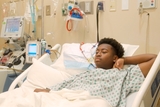
Children’s Hospital of Philadelphia (CHOP) announced that its first patients outside of clinical trials have begun the treatment process for the newly FDA approved sickle cell gene therapies known as Lyfgenia™ and Casgevy™. CHOP is an approved site to offer Lyfgenia, which is manufactured by bluebird bio and uses a cell-based gene therapy, as well as Casgevy, which is manufactured by Vertex Pharmaceuticals and uses the Nobel Prize-winning CRISPR gene-editing technology.
Sickle cell disease is an inherited blood disorder that affects hemoglobin, the protein that carries oxygen throughout the body. The condition is characterized by chronic anemia, periodic episodes of pain and other complications, like stroke, organ damage and short life expectancy, due to deformed or crescent shaped blood cells that can cause blockages in blood vessels.
For nearly two decades, CHOP has spearheaded the treatment of sickle cell disease and played a critical role in the clinical trials that led to the historic FDA approvals of these two gene therapies. Clinical trials showed that the therapies prevent cells from taking on the crescent shape and eliminate sickle cell-related pain episodes in more than 90% of patients.
Patients currently undergoing the gene therapy process are being treated at CHOP’s Comprehensive Center for the Cure of Sickle Cell Disease and Other Red Blood Cell Disorders (CuRED) program. The CuRED clinical team is a collaboration across the Division of Hematology, the Cellular Therapy and Transplant Section within the Division of Oncology and many other areas of CHOP.
It can take patients a year to complete the process of taking Lyfgenia and Casgevy, which includes stem cell collection, transfusions, chemotherapy and multiple inpatient hospital stays. Once discharged, patients need continuous monitoring with short and long-term follow-up medical visits. They also need to adhere to isolation precautions, including not returning to school or in-person work for several months as their immune system fully recovers.
Learn more about what gene therapy means for patients living with sickle cell disease in this CBS Philadelphia story: https://www.cbsnews.com/philadelphia/news/sickle-cell-disease-childrens-hospital-of-philadelphia/.
Featured in this article
Specialties & Programs
Children’s Hospital of Philadelphia (CHOP) announced that its first patients outside of clinical trials have begun the treatment process for the newly FDA approved sickle cell gene therapies known as Lyfgenia™ and Casgevy™. CHOP is an approved site to offer Lyfgenia, which is manufactured by bluebird bio and uses a cell-based gene therapy, as well as Casgevy, which is manufactured by Vertex Pharmaceuticals and uses the Nobel Prize-winning CRISPR gene-editing technology.
Sickle cell disease is an inherited blood disorder that affects hemoglobin, the protein that carries oxygen throughout the body. The condition is characterized by chronic anemia, periodic episodes of pain and other complications, like stroke, organ damage and short life expectancy, due to deformed or crescent shaped blood cells that can cause blockages in blood vessels.
For nearly two decades, CHOP has spearheaded the treatment of sickle cell disease and played a critical role in the clinical trials that led to the historic FDA approvals of these two gene therapies. Clinical trials showed that the therapies prevent cells from taking on the crescent shape and eliminate sickle cell-related pain episodes in more than 90% of patients.
Patients currently undergoing the gene therapy process are being treated at CHOP’s Comprehensive Center for the Cure of Sickle Cell Disease and Other Red Blood Cell Disorders (CuRED) program. The CuRED clinical team is a collaboration across the Division of Hematology, the Cellular Therapy and Transplant Section within the Division of Oncology and many other areas of CHOP.
It can take patients a year to complete the process of taking Lyfgenia and Casgevy, which includes stem cell collection, transfusions, chemotherapy and multiple inpatient hospital stays. Once discharged, patients need continuous monitoring with short and long-term follow-up medical visits. They also need to adhere to isolation precautions, including not returning to school or in-person work for several months as their immune system fully recovers.
Learn more about what gene therapy means for patients living with sickle cell disease in this CBS Philadelphia story: https://www.cbsnews.com/philadelphia/news/sickle-cell-disease-childrens-hospital-of-philadelphia/.
Contact us
Jennifer Lee
Sickle Cell and Red Cell Disorders Curative Therapy Center (CuRED)